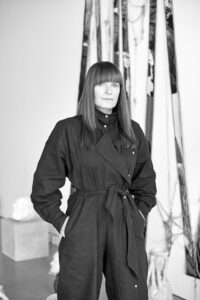Isidora Ilić

– a film/video artist, writer and cultural worker who lives and works in Belgrade. She graduated in Comparative Literature and Literary Theory at the University of Belgrade, attended the undergraduate program Women’s and Gender Studies at the Centre for Women’s Studies in Belgrade, and graduated from the Film School at the Academic Film Centre in Belgrade. Ilić is the co-founder and coordinator of the Transimage platform for politics of the moving images. She collaborates with Boško Prostran as part of the Doplgenger artist duo, whose practice is based on questioning the relationship between art and politics. Doplgenger‘s works are in public collections and have been presented at individual and group exhibitions and at film/video festivals in country and abroad. They are the winners of art scholarships, film festival awards and Politika’s “Vladislav Ribnikar” award and were artists-in-residence.
My first clash with the art system – which, as the state’s ideological apparatus, reproduces structural inequalities – was the entrance exam for directing studies at the Academy of Arts in Novi Sad, when the director, who was in charge of selecting the students to be admitted, asked me: “My colleague, how do you think you will fare in dealing with directing as a male profession?”. In my naive and youthful obliviousness – or was this unpreparedness just a consequence of the dominant discourse of Yugoslavia and the rhetoric that moulded generations – I was unaware of male and female professions, even less about male and female arts. Art was something that anyone could, if they wanted to, practise through free school clubs and extracurricular activities, cultural-artistic societies and ensembles and culture centres1.
This epistemological bomb will generate my relationship with the (art) system and will further imprint on my practice, shifting my interests towards what is marginal and what deconstructs the dominant customs: amateur approach versus expert knowledge, research methods in art, work with discarded images (found-footage) and archival material versus even more new and polished 8K moving pictures, experimental film construction versus the inviolability of the documentary “truth,” collective creation versus individual authorship.
The artistic duo Doplgenger, consisting of Boško Prostran and myself, began its film self-education at the Academy Cinema Club, one of the oldest Yugoslav amateur cinema clubs. That process was marked by collective work and experimentation2.
Studying and practising experimental film awoke us to our position vis-à-vis the very medium of the moving pictures, which rests on manipulation. It is important for us to articulate the constitutive elements of the media and to make the manipulation visible in order to draw attention to what it hides and wants to show as “a natural order”3.
Most of our works are created in the cinematographic practice of found-footage, the use of already existing film and sound material. Dealing with this type of film, which is somewhat related to the archival film, means dealing with the montage of images of the past and images that you did not take and that are not “yours”4. This fact inevitably calls for an activist attitude towards the issue of intellectual property, i.e. privatisation of memory. The possibility to re-examine and (re)interpret the past through the assembly of different narrative and pictorial fragments with different historical and subjective situations is, on the other hand, a historical responsibility.
The task of the historical materialist according to Benjamin is to set in motion the experience of history that is inherent in each new contemporaneity. That experience in the case of the Western Balkans area today, which has turned from the semi-periphery of Europe into semi-colonies, is a repeat experience of socialist Yugoslavia and its history, an experience facing the future. In this respect, the post-socialist and post-colonial transformations that the Yugoslav society has undergone and is still going through, stimulated our interest in re-examining the status of the media image in social processes, both in the period after the breakup of Yugoslavia5 and in the course of its duration6.
Art as a social practice is emancipatory and has the ability to reflect critically on social and political reality but the question remains to what extent the system allows this and to what extent the artist wants and is able to do it. The latest research shows that the class impenetrability of the creative sector is more and more pronounced and that only the children of the rich opt for an artistic career. Art education costs money and artistic work, despite all efforts, remains poorly paid or unpaid. Self-education, the position of an amateur, collective and joint work, seem to me to be current and very necessary today.
The text is written in collaboration with Simona Ognjanović (2022).
1At that moment, Yugoslavia, the country in which I was born, officially stopped existing three years prior and the processes - invisible to many - of social "transformation" from socialism to capitalism are already well underway.2An amateur, as someone who loves what he does but does not have the knowledge (expertise) to perform that work is characterised by the path of self-education, which he embarks upon out of love in order to acquire new knowledge. Amateurs thus go beyond the established boundaries of the system, breaking the ties between their social position and mental preparation. The emancipation of the amateur represents the deconstruction of expert knowledge rooted in the ideology of capitalism - through which the order of inequality is generated and maintained. We see the amateur approach as a tool in the fight for a fairer society of equals, so we edited the publication "Amateurs for Film: Notebook for Amateur Approach and the Moving Images", see: https://transimage.files.wordpress.com/2017/09/amateri-za-film-web.pdf.
3Link: Feminist film theories played a significant role with us and influenced some of our works (Johhny’s video, Surplus, Kameradin).
4It is a threefold political act – it implies the ecology of the image, historical responsibility and an activist attitude. The ever - increasing digitization and availability of moving pictures unavoidably require the existence of a certain ecological awareness against an environment saturated with image inflation. Why record? The artistic process of appropriation and of “readymade” as an utilisation of already existing images requires an answer to the question "who has the ownership of memory" and that, as a demand for the expropriation of images and the opening of archives, is a question of public space.
5In a series of works created since 2011 under the title "Fragments Untitled" (Fragments untitled #0, Fragments untitled #1, Fragments untitled #2, Fragments untitled #3, Fragments untitled #4, Fragments untitled #5, Fragments untitled #6, Fragments untitled #7), we deal with the politics of media images that participated in the construction of historical narratives in the area of the former Yugoslavia in the period from 1980 to 2000. Our generation followed the breakup of Yugoslavia through TV screens, so our own memory of those events was mediatized, that is, constructed by media transmission. Addressing the marginalised and ephemeral aspects of the media stream, "Fragments Untitled" as a series of media fragments in different formats, examines the suppressed images of collective memory and what remains marginalised in history.
6In a series of works “Beneath A Starless Sky As Dark And Thick As Ink” (Beneath A Starless Sky As Dark And Thick As Ink, and the tranquil waterway leading to the uttermost ends of the earth flowed sombre under an overcast sky, World Migration Map (2010-2015), Bread riots 1977, and in the eyes of the hungry there is a growing wrath) we used the archival material of Radio and Television of Vojvodina to question the complex relations between work, war and the economy, focusing on the issue of media representation of economic migrations - from the phenomenon of temporary economic migrations, the so-called "gastarbeiter" in post-war Europe in the 60s, through the export of technology and labour to Non-Aligned countries, to the contemporary polarised discussion about the difference between economic and war refugees in the course of contemporary mass migrations to Europe. On the other hand, the project „Jugoslovenski socijalizam na filmu” ("Yugoslav Socialism on Film") was dedicated to the re-examination of the films that were created in the first two phases of Self-governing socialism (1950 - 1974) and which, according to their approach, appear as a method of new comprehension of the diversified Yugoslav reality. We were interested in finding out how the self-governing Yugoslav society projected itself and, at the same time, how it was detected in film art.
![]()
– je film/video umetnica, spisateljica i kulturna radnica, koja živi i radi u Beogradu. Diplomirala je opštu književnost i teoriju književnosti na Univerzitetu u Beogradu, pohađala je dodiplomski program Ženskih i rodnih studija u Centru za ženske studije i rodna istraživanja u Beogradu, završila je Filmsku školu Akademskog filmskog centra u Beogradu. Ilićeva je koosnivačica i koordinatorka Transimage platforme za politiku pokretnih slika. Sarađuje sa Prostran Boškom u okviru umetničkog dua doplgenger, čija se praksa temelji na preispitivanju odnosa umetnosti i politike. Radovi doplgengera se nalaze u javnim kolekcijama, predstavljeni su na samostalnim i grupnim izložbama i na film/video festivalima u zemlji i inostranstvu. Dobitnici su umetničkih stipendija i rezidencijalnih boravaka, nagrada filmskih festivala i Politikine nagrade „Vladislav Ribnikar”.
Moj prvi sudar sa sistemom umetnosti, koji kao državni ideološki aparat reprodukuje strukturalne nejednakosti, bio je prijemni ispit za studije režije na Akademiji umetnosti u Novom Sadu kada me je reditelj, koji je primao klasu, upitao: „Koleginice, kako mislite da se nosite sa režijom kao muškom profesijom?”. Moje naivno i mladalački nesvesno, ili je ova nespremnost bila pak samo posledica dominantnog diskursa jugoslovenstva i retorike koja je formirala generacije, nije znalo za muške i ženske profesije, još manje za muške i ženske umetnosti. Umetnost je bila nešto što je svako mogao, ako se to želelo, praktikovati kroz besplatne školske sekcije i van-nastavne aktivnosti, kulturno-umetnička društva i domove kultura1.
Ova epistemološka bomba generisaće moj odnos spram sistema (umetnosti) i obeležiće dalje moju praksu, pomerajući moja interesovanja ka onom što je marginalno i što dekonstruiše dominantne uzuse: amaterski pristup naspram ekspertskog znanja, istraživačke metode u umetnosti, rad sa odbačenim slikama (found-footage) i arhivskim materijalom naspram još novih i upeglanih 8K pokretnih slika, eksperimentalna filmska konstrukcija naspram neprikosnovenosti dokumentarne „istine”, kolektivno stvaranje nasuprot individualnom autorstvu.
Umetnički duo Doplgenger, kojeg činimo Boško Prostran i ja, filmsko samoobrazovanje je započeo u Akademskom kino-klubu, jednom od najstarijih jugoslovenskih amaterskih kino-klubova. Taj proces je bio obeležen kolektivnim radom i eksperimentom2.
Učenje i praktikovanje eksperimentalnog filma osvestilo je našu poziciju spram samog medija pokretne slike koji počiva na manipulaciji. Nama je važno da artikulišemo konstitutivne elemente medija i da manipulaciju učinimo vidljivom kako bi skrenuli pažnju na ono što ona skriva i želi da prikaže kao “prirodni poredak“3.
Većina naših radova nastaje u kinematografskoj praksi faund-futidž, kao upotreba već postojećeg filmskog i zvučnog materijala. Baviti se ovom vrstom filma, kojoj donekle pripada i arhivski film, znači baviti se montažom slika prošlosti i slika koje niste snimili i koje nisu „vaše”4. Ova činjenica nužno traži jedan aktivistički odnos spram pitanja intelektualne svojine tj. privatizacije pamćenja. Mogućnost da se prošlost preispita i (re)interpretira kroz montiranje različitih narativnih i slikovnih fragmenta sa različitim istorijskim i subjektivnim situacijama jeste, pak, istorijska odgovornost.
Zadatak istorijskog materijaliste po Benjaminu je da pokrene iskustvo istorije koje je svojstveno svakoj novoj sadašnjosti. To iskustvo u slučaju zapadno-balkanskih prostora danas, koji od poluperiferije Evrope postaju polukolonije, jeste ponovno iskustvo socijalističke Jugoslavije i njene istorije, iskustvo okrenuto ka budućnosti. U tom pogledu, postsocijalističke i postkolonijalne transformacije kroz koje je prošlo i još uvek prolazi jugoslovensko društvo potaklo je naše interesovanje da preispitamo status medijske slike u društvenim procesima, i to kako u periodu nakon raspada Jugoslavije5, tako i tokom njenog trajanja6.
Umetnost kao društvena praksa je emancipatorska i ima mogućnost da kritički promišlja društvenu i političku realnost, ali ostaje pitanje u kojoj meri sistem to dozvoljava, a umetnik želi i može to da čini. Poslednja istraživanja pokazuju da je sve je izraženija klasna nepropusnost kreativnog sektora i da se samo deca bogatih opredeljuju za umetničku karijeru. Umetničko obrazovanje košta, a umetnički rad, i pored svih nastojanja, i dalje ostaje slabo plaćen ili neplaćen. Samoobrazovanje, pozicija amatera, kolektivni i udruženi rad, čine mi se danas aktuelnim i preko potrebnim.
Tekst je napisan u saradnji sa Simonom Ognjanović (2022).
1U tom trenutku Jugoslavija, zemlja u kojoj sam rođena, zvanično ne postoji već tri godine i procesi, za mnoge nevidljive, društvene „transformacije” od socijalizma ka kapitalizmu već uveliko su u toku.2Amatera kao onog ko voli ono čime se bavi ali nema znanje (stručnost) za obavljanje tog posla karakteriše put samoobrazovanja na koji se kreće iz ljubavi kako bi se steklo novo znanje. Amateri tako prekoračuju uspostavljene granice sistema, raskidaju veze između svog društvenog položaja i mentalne spreme. Amaterova emancipacija predstavlja dekonstrukciju ekspertskog znanja ukorenjenog u ideologiji kapitalizma putem kojeg se generiše i održava poredak nejednakosti. Amaterski pristup vidimo kao alatku u borbi za pravednije društvo jednakih pa smo uredili publikaciju „Amateri za film: radna sveska za amaterski pristup i pokretne slike”.
3Feminističke filmske teorije imale su značajnu ulogu za nas i uticale na neke naše radove (Johhny’s video, Surplus, Kameradin).
4To je trostruko politički čin – on podrazumeva ekologiju slike, istorijsku odgovornost i aktivistički odnos. Sve veća digitalizacija i dostupnost pokretnih slika nužno zahtevaju postojanje izvesne ekološke svesti naspram okruženja zasićenog inflacijom slika. Zašto snimati? Umetnički postupak aproprijacije i redimejda kao korišćenja već postojećih slika zahteva odgovor na pitanje “ko ima vlasništvo nad pamćenjem” a to, kao zahtev za eksproprijacijom slika i otvaranjem arhiva, jeste pitanje javnog prostora.
5U nizu radova koji nastaju od 2011. godine pod nazivom „Neimenovani fragmenti” (Fragments untitled #0, Fragments untitled #1, Fragments untitled #2, Fragments untitled #3, Fragments untitled #4, Fragments untitled #5, Fragments untitled #6, Fragments untitled #7) bavimo se politikom medijskih slika koje su učestvovale u izgrađivanju istorijskih narativa na prostoru bivše Jugoslavije u razdoblju od 1980. do 2000. godine. Naša generacija je raspad Jugoslavije pratila putem TV ekrana, tako da je naše vlastito sećanje na te događaje bilo medijatizirano, odnosno, konstruisano medijskim prenosom. Adresirajući ono marginalizovano i efemerno medijskog toka, „Neimenovani fragmenti” kao serija medijskih fragmenata u različitim formatima, ispituju potisnute slike kolektivnog sećanja i onog što je ostalo skrajnuto u istoriji.
6U seriji radova „Kroz noć bez zvezda, tamnu i gustu kao mastilo” (Beneath A Starless Sky As Dark And Thick As Ink, and the tranquil waterway leading to the uttermost ends of the earth flowed sombre under an overcast sky, World Migration Map (2010-2015), Bread riots 1977, and in the eyes of the hungry there is a growing wrath) smo na arhivski materijal Radio-televizije Vojvodine propitivali složene odnose rada, rata i ekonomije, fokusirajući se na pitanje medijske reprezentacije ekonomskih migracija – od fenomena privremenih ekonomskih migracija tzv. „gastarbeitera” u posleratnoj Evropi 60-ih, preko izvoza tehnologije i radne snage u zemlje Nesvrstanih, do savremene polarizovane rasprave o razlici između ekonomskih i ratnih izbeglica u toku savremenih masovnih migracija u Europu. S druge strane, projekat „Jugoslovenski socijalizam na filmu” je bio posvećen ponovnom pregledu filmova koji su nastali u prve dve faze samoupravnog socijalizma (1950.-1974.) i koji se po svom pristupu javljaju kao metoda novog sagledavanja diverzificirane jugoslovenske stvarnosti. Interesovalo nas je na koji način se samoupravno jugoslovensko društvo projektovalo i, istovremeno, kako je bilo detektovano u filmskoj umetnosti.
![]()


